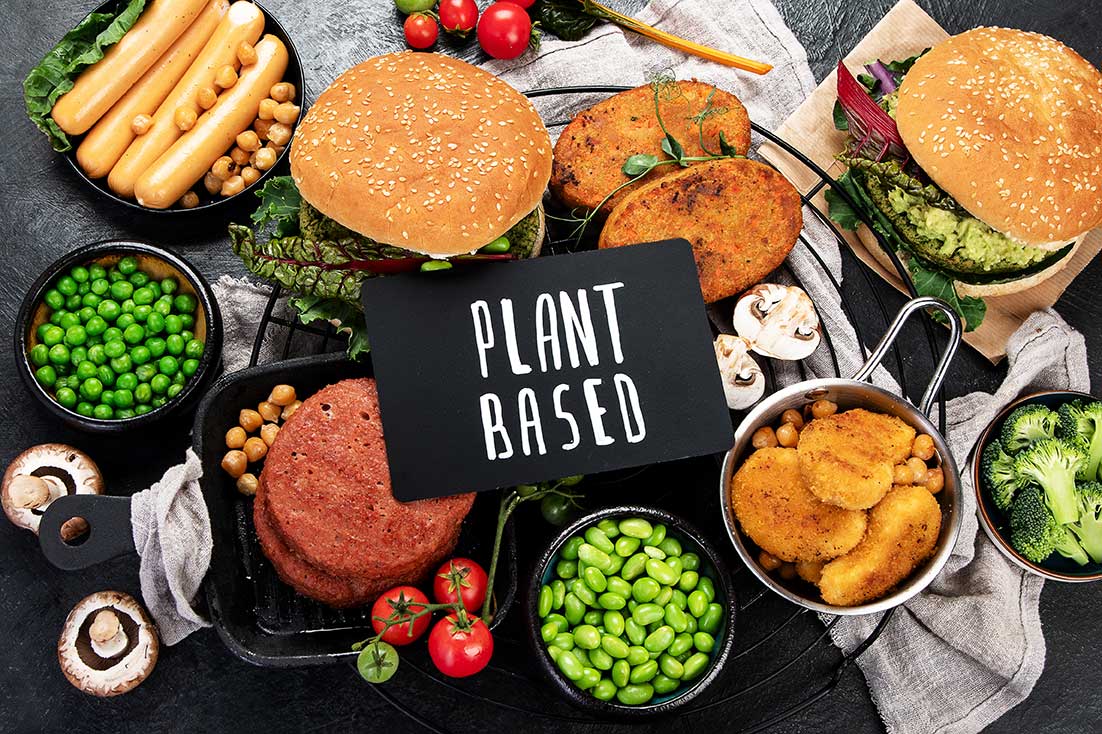The Ultimate Sugar Free Sauces Taste Test: Which One Wins?
The Ultimate Sugar Free Sauces Taste Test: Which One Wins?
Blog Article
All Concerning Healthy Food: Advantages of Taking On Plant Based Alternatives
The discussion bordering plant-based diet plans has actually obtained substantial interest in the last few years. Many individuals are discovering the potential health and wellness advantages, dietary benefits, and ecological influences connected with these nutritional choices. As people come to be much more mindful of their food's influence on health and sustainability, concerns occur concerning the practicalities of adopting such a lifestyle. What specific modifications can one anticipate, and exactly how might these choices improve not only personal wellness but additionally the planet's future?
Recognizing Plant-Based Diet Regimens
Although many individuals link plant-based diet regimens mostly with vegetarianism or veganism, these diets can incorporate a wide variety of eating patterns that prioritize whole, minimally processed plant foods. Such diet plans frequently include fruits, vegetables, entire grains, seeds, nuts, and legumes, while removing or restricting animal products. This versatility enables people to customize their nutritional options according to nutritional demands and individual choices. Some might take on a mainly plant-based diet plan while still periodically consuming meat or dairy, usually described as a flexitarian method. The emphasis continues to be on incorporating even more plant foods, which can bring about a varied selection of meals and tastes. Recognizing these numerous analyses of plant-based eating is necessary for appreciating its ease of access and charm in contemporary food culture.
Health And Wellness Perks of Plant-Based Foods
The health benefits of plant-based foods are substantial, supplying a nutrient density benefit that sustains general well-being. Study suggests that these foods can boost heart wellness and play a necessary role in reliable weight management. By integrating a lot more plant-based alternatives, people may enhance their dietary options and promote long-lasting health and wellness.
Nutrient Thickness Benefit
Nutrient density plays a vital function in the wellness advantages of plant-based foods, making them a compelling choice for those seeking a balanced diet regimen. Plant-based foods, such as fruits, veggies, beans, nuts, and entire grains, are typically rich in essential vitamins, minerals, and antioxidants while being lower in calories. This high nutrient density allows individuals to take in fewer calories while still meeting their dietary needs. In addition, these foods are loaded with dietary fiber, promoting digestion health and wellness and helping in weight management. By incorporating nutrient-dense plant-based choices, consumers can enhance their total health and wellness, support their body immune systems, and minimize the danger of chronic conditions. Eventually, the nutrient density of plant-based foods underscores their relevance in a health-conscious way of life.
Heart Health And Wellness Improvement

Weight Management Assistance
In addition to advertising heart health, a plant-based diet plan can considerably assist in weight administration. This nutritional approach emphasizes entire foods such as fruits, vegetables, vegetables, nuts, and whole grains, which are generally reduced in calories and higher in fiber contrasted to animal-based products. The high fiber material assists increase satiation, reducing general calorie consumption. Additionally, plant-based diet plans are often abundant in essential nutrients while reduced in unhealthy fats, making it much easier to maintain a healthy weight. Plant Based Beef. Research suggests that people who take on a plant-based way of life often tend to have reduced body mass indexes (BMIs) and experience more successful weight-loss contrasted to those that eat meat-heavy diets. Welcoming plant-based options is a tactical choice for reliable weight management.
Nutritional Value of Plant-Based Components
Plant-based ingredients are abundant in crucial nutrients, offering a diverse range of vitamins, minerals, and antioxidants that add to total wellness. A contrast of healthy protein sources exposes that while pet items are typically deemed remarkable, numerous plant-based choices provide adequate protein and various other advantageous substances. Comprehending the dietary worth of these components can assist individuals make informed nutritional selections.
Important Nutrients in Plants
Nutrient-rich ingredients found in plants offer a varied selection of crucial vitamins and minerals that contribute greatly to overall health. These active ingredients are abundant in vitamins A, C, and K, which support immune feature, vision, and blood clot, respectively. In addition, plants give vital minerals such as magnesium, potassium, and calcium, important for heart health and wellness, muscle feature, and bone strength. The existence of fiber in plant-based foods aids food digestion and promotes a healthy gut microbiome. Antioxidants, located generously in fruits official website and vegetables, assistance battle oxidative tension and lower inflammation. Moreover, numerous plant foods are reduced in calories yet high in nutrients, making them an exceptional choice for those looking for to maintain a healthy weight while making certain optimal nutrient intake.
Comparing Healthy Protein Resources
Protein sources vary considerably in their nutritional accounts, with plant-based components using distinct advantages. Unlike pet proteins, which usually include hydrogenated fats and cholesterol, plant proteins often tend to be reduced in these undesirable elements. Legumes, nuts, seeds, and whole grains are abundant in crucial amino acids, fiber, vitamins, and minerals. Lentils provide high healthy protein content along with substantial iron and folate, while quinoa is a total healthy protein, using all nine crucial amino acids. Additionally, plant-based healthy proteins are typically accompanied by antioxidants and phytochemicals that sustain overall wellness. The change to plant-based protein resources not only boosts nutritional consumption however additionally lines up with lasting dietary methods, reducing ecological influence and promoting lasting health advantages.
Ecological Influence of Plant-Based Eating
As recognition of climate change expands, many individuals are discovering sustainable nutritional options that can substantially reduce their ecological impact. Plant-based consuming has become a substantial contributor to decreasing greenhouse gas emissions, which are mostly associated with livestock production. The farming of fruits, vegetables, veggies, and grains usually calls for less resources, such as water and land, compared to animal farming. In addition, plant-based diet regimens can bring about decreased deforestation, as less land is required for grazing livestock or expanding pet feed. By shifting in the direction of plant-based alternatives, customers can support biodiversity and promote much healthier environments. In general, accepting plant-based eating not just advantages individual wellness but likewise stands for a crucial step towards environmental sustainability and conservation efforts.
Conquering Common Misconceptions
While several people recognize the advantages of a plant-based diet plan, several false impressions commonly deter them from completely accepting this lifestyle. An usual idea is that plant-based diets do not have adequate healthy protein; nevertheless, countless plant resources, such as legumes, nuts, and tofu, supply adequate healthy protein. In addition, some think that this diet regimen is expensive, when actually, staples like beans, rice, and seasonal vegetables can be fairly budget friendly. One more false impression is that plant-based consuming is excessively restrictive, whereas it in fact supplies a varied range of tastes and foods. Lastly, lots of worry that a plant-based diet regimen might result in deficiencies, yet with correct preparation, individuals can get all needed nutrients, including vitamins and minerals, while appreciating a wide range of scrumptious meals.
Tips for Transitioning to a Plant-Based Lifestyle
Making the change to a plant-based lifestyle can be an enhancing experience, though it usually requires some support to navigate the preliminary adjustments. Individuals are motivated to begin progressively, incorporating even more fruits, vegetables, legumes, and entire grains right into their dishes while decreasing meat and milk intake. Meal planning is crucial; preparing a regular menu can assist ease the modification and stop last-minute unhealthy options. Discovering click for more cooking methods and new recipes can likewise improve the experience and maintain enjoyment concerning plant-based consuming. Furthermore, signing up with assistance teams or areas can give motivation and share useful pointers. Ultimately, remaining educated about nourishment assurances well balanced dishes, protecting against shortages while fostering a healthy, rewarding plant-based way of living.
Delicious Plant-Based Meal Concepts
Exploring tasty plant-based dish ideas can influence individuals to embrace a much more nourishing look at here diet. One prominent option is a passionate quinoa salad, including cherry tomatoes, cucumber, and a tangy lemon-tahini dressing. One more fave is a savory lentil stew, loaded with carrots, celery, and aromatic natural herbs, perfect for a calming supper. For breakfast, overnight oats made with almond milk, chia seeds, and topped with fresh berries supply a nutritious beginning to the day. Additionally, a dynamic vegetable stir-fry with tofu and a range of colorful veggies can be a fast yet pleasing dish. Ultimately, creamy avocado toast on whole-grain bread, sprinkled with seasonings and seeds, offers an easy yet delicious snack. These dishes display the range and splendor of plant-based consuming.

Often Asked Concerns
Can a Plant-Based Diet Plan Offer Sufficient Protein?
The concern of whether a plant-based diet regimen can supply adequate protein prevails. Numerous resources, including beans, nuts, seeds, and whole grains, can fulfill protein requires successfully, supporting a well balanced and nutritious diet plan for people.
Are Plant-Based Diet Plans Ideal for Children?
The viability of plant-based diet plans for children depends upon mindful preparation. Appropriate nutrients need to be guaranteed, consisting of healthy proteins, minerals, and vitamins. With appropriate assistance, such diet regimens can support healthy and balanced development and advancement in youngsters.
How Do I Eat in restaurants on a Plant-Based Diet?
Eating in restaurants on a plant-based diet regimen involves seeking dining establishments with diverse food selections, asking for adjustments, and exploring vegan-friendly alternatives. Planning ahead and connecting dietary choices can improve the dining experience while keeping nutritional selections.
What Are Usual Allergens in Plant-Based Foods?
Common allergens in plant-based foods include soy, gluten, nuts, and seeds - Plant Based Chicken. Individuals adhering to a plant-based diet regimen ought to understand these irritants and check out labels carefully to prevent adverse responses and ensure risk-free intake
Can Plant-Based Diets Aid With Weight Management?
Study shows that adopting a plant-based diet may assist in weight loss because of its usually reduced calorie thickness and higher fiber material. This mix can boost satiety, helping people manage their caloric intake successfully. Numerous people link plant-based diet plans mostly with vegetarianism or veganism, these diets can include a wide range of eating patterns that prioritize whole, minimally processed plant foods. Nutrient density plays an important function in the health advantages of plant-based foods, making them an engaging selection for those seeking a well balanced diet regimen. Plant-based diet regimens have been revealed to markedly boost heart health, as they often have aspects that support cardiovascular feature. In addition to advertising heart health, a plant-based diet plan can substantially help in weight monitoring. An usual idea is that plant-based diet regimens do not have adequate protein; however, various plant sources, such as vegetables, nuts, and tofu, provide adequate healthy protein.
Report this page